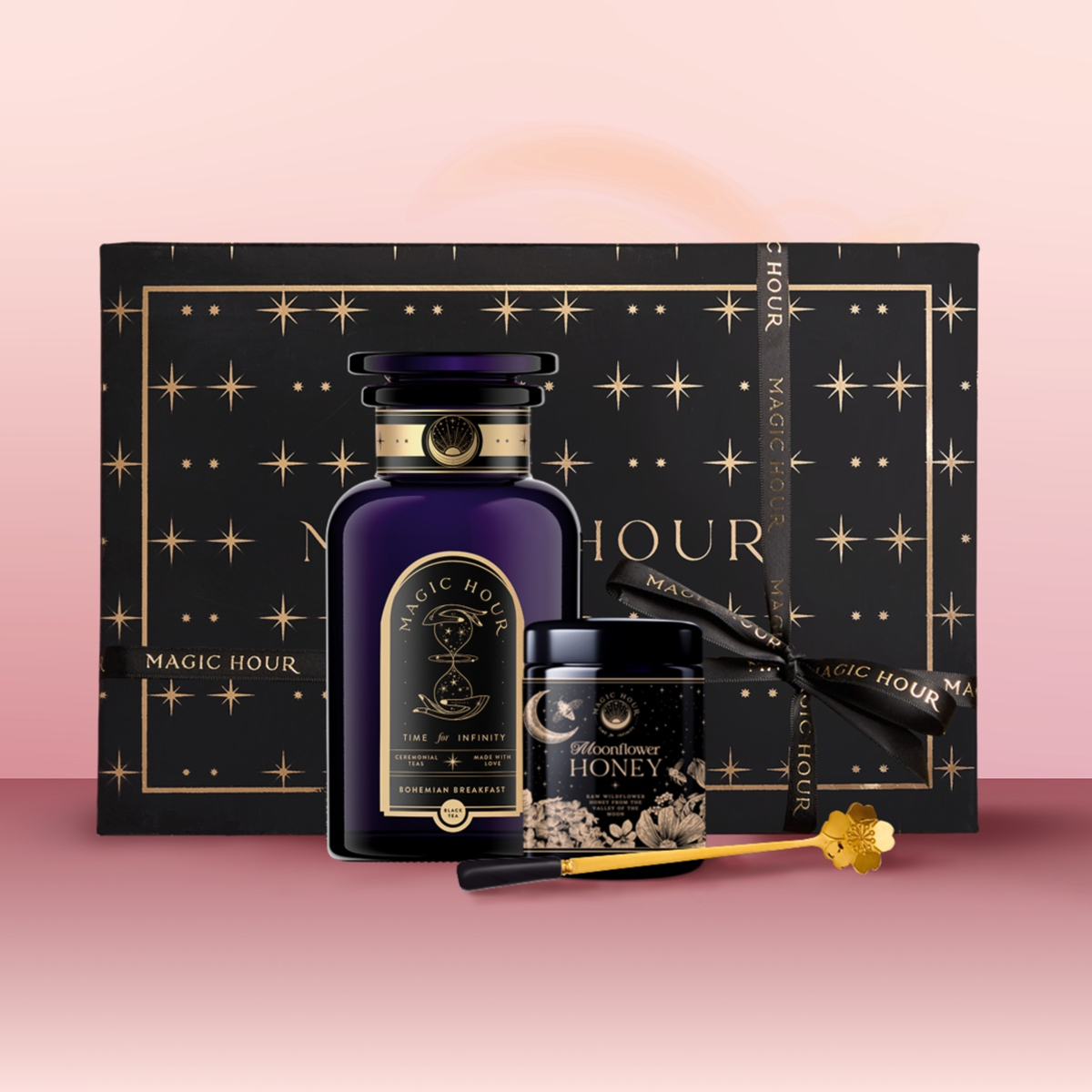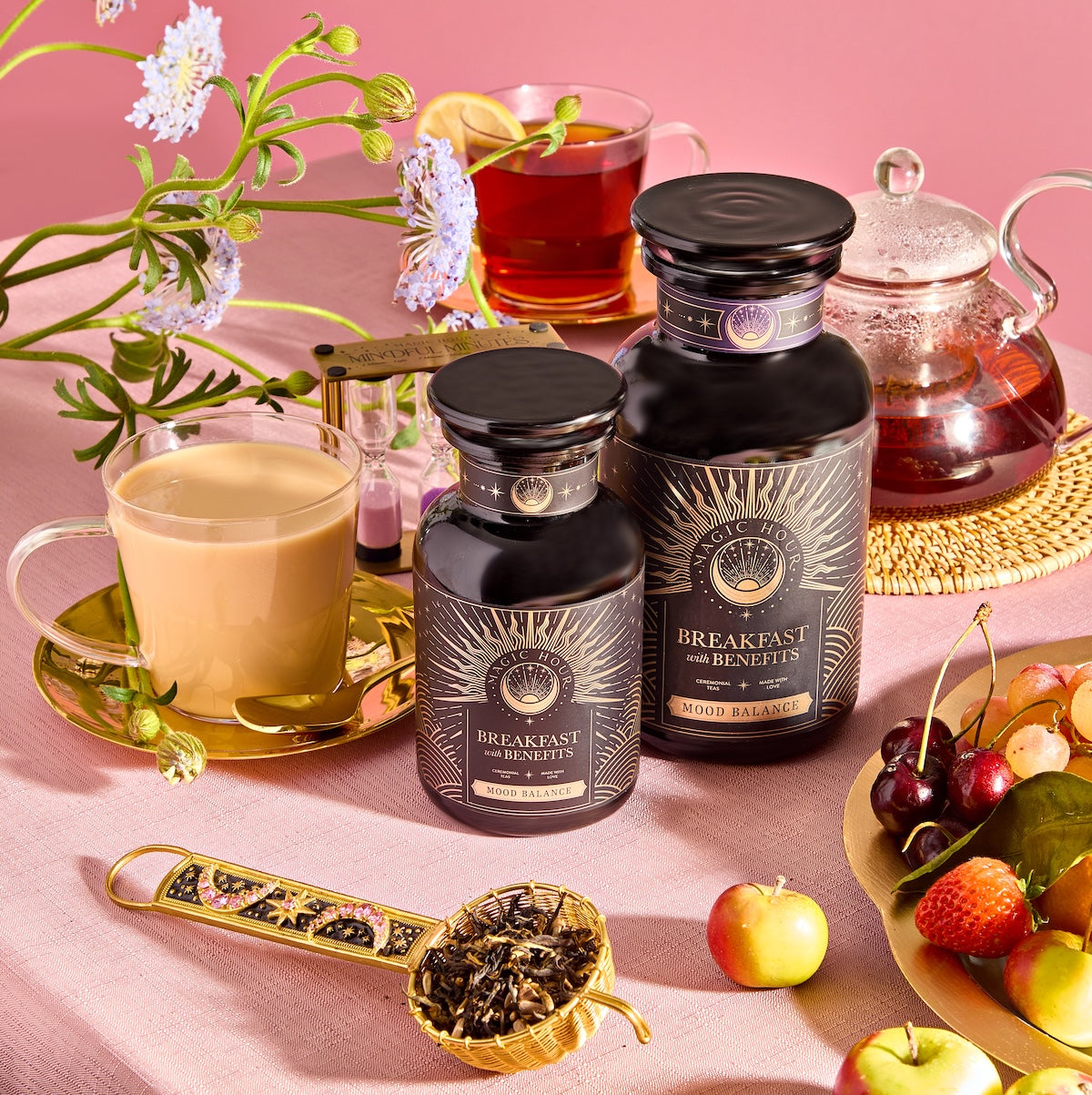The humble breakfast tea is getting a transformative upgrade with adaptogenic herbs and functional botanicals now. Discover how our new Breakfast with Benefits™ innovative blends are revolutionizing morning rituals while delivering evidence-backed health benefits!
The Rich History of Breakfast Tea: A Global Morning Ritual
Long before specialized functional blends entered our kitchens, breakfast tea established itself as a cornerstone of morning routines worldwide. The concept of a strong, invigorating morning tea dates back to the early 18th century in Britain, when tea consumption became firmly embedded in the cultural fabric of western society.
The Birth of English Breakfast Tea
The origins of what we now call "English Breakfast Tea" are surprisingly not entirely English. According to tea historians, the concept originated with Queen Anne in the early 1700s, who enjoyed a strong black tea blend with her morning meal. However, the popularized version we know today took shape in the 1800s in Scotland, where tea merchant Robert Drysdale created a robust Chinese Keemun blend designed specifically for morning consumption.
In the 1830s, the blend gained popularity in England and eventually crossed the Atlantic to America, where increased demand led to adaptations using teas from India (particularly Assam) and Ceylon (modern-day Sri Lanka) following the expansion of British tea cultivation in these regions.
The Global Expansion of Morning Tea Rituals
While the British were developing their breakfast tea traditions, other cultures continued to enjoy their own morning rituals:
• In China, the tradition of morning tea dates back thousands of years, with regional preferences for varieties ranging from delicate white teas to robust pu-erhs
• Russian tea culture featured morning samovars brewing intense zavarka tea concentrate
• Indian chai traditions combined black tea with milk, spices, and sweeteners for a morning energy boost
• Japanese morning rituals often centered around green teas like sencha or genmaicha
What united these diverse traditions was the recognition that morning tea offered something beyond mere refreshment—it provided a momentary pause, a gentle awakening, and importantly, sustained energy to begin the day- a Magic Hour Ritual at dawn or shortly after!
From Tradition to Function: The Science of Tea Benefits
The evolution from traditional breakfast teas to today's functional blends wasn't a marketing gimmick—it was guided by emerging scientific understanding of tea's inherent health properties.
The Natural Benefits of Traditional Tea
Modern science has validated what traditional cultures intuited about tea's benefits for millenia. A comprehensive review in the journal Antioxidants highlighted that the polyphenols in black tea (particularly theaflavins and thearubigins) demonstrate significant antioxidant activity, potentially contributing to cardiovascular health and metabolic function [1].
Black tea contains approximately 60-90 mg of caffeine per 8 oz cup—enough to provide alertness without the jittery effects often associated with coffee. This is complemented by L-theanine, an amino acid that promotes relaxation without sedation, creating what researchers call "alert calmness" [2].
A meta-analysis published in the European Journal of Epidemiology found that regular black tea consumption (3+ cups daily) was associated with a 21% reduced risk of stroke [3]. Even my mom has had her “bad” cholesterol go down from drinking our Bohemian Breakfast, her doctor was floored!
The Functional Evolution: Adding Targeted Benefits
Today we’ve innovated the ritual of breakfast tea blends by tucking in the most potent herbs and adaptogens with specific health-supporting properties into these delicious, hearty and satisfying black teas. I figure you are drinking tea in the morning (or coffee!) so why not sneak in some added health benefits while you’re at it? Tada! Now you can!
Magic Hour’s New Breakfast Ritual: Functional Teas for Modern Needs
The modern lifestyle presents unique challenges—chronic stress, metabolic imbalances, and mood fluctuations that our ancestors didn't face in the same persistent way. This has created demand for morning rituals that do more than just wake us up—they need to support our overall wellbeing. Also, after years of taking SO MANY capsules of herbs, I wanted us to simplify and make the herbal medicines more accessible and delicious. The happier you are sipping these blends, the better your mood :).
The Specialized Benefits of Oolong and Puerh Teas
Before diving into our specific blends, it's worth highlighting two extraordinary tea varieties that feature prominently in many of my formulations for good reason:
Ti Quan Yin Oolong: The Iron Goddess of Mercy
Ti Quan Yin (also spelled Tieguanyin) is a legendary oolong tea with a unique semi-oxidized profile that places it between green and black teas in processing. This partial oxidation creates a distinctive profile of bioactive compounds with impressive health benefits.
Research published in the Journal of Nutrition found that oolong tea consumption was associated with increased fat oxidation and energy expenditure compared to water. Participants who consumed oolong tea showed a 12% increase in fat oxidation rates over a 24-hour period [13].
The catechins and theaflavins in oolong tea appear to work synergistically with caffeine to enhance metabolic effects. A study in the Chinese Journal of Integrative Medicine found that oolong tea consumption was associated with decreased body weight and body fat content in subjects with mild obesity, suggesting its potential in supporting weight management efforts [14].
Puerh Tea: The Fermented Wellness Elixir
Puerh tea undergoes a unique post-fermentation process that transforms its chemical composition, creating distinctive compounds not found in other teas. This ancient tea from Yunnan, China has been used for centuries to aid digestion and "melt away fat" according to traditional Chinese medicine.
Modern research supports some of these traditional claims. A study published in Food & Function demonstrated that puerh tea extract significantly reduced serum levels of cholesterol and triglycerides while improving intestinal microbiota composition [15]. The microbial metabolites produced during puerh fermentation may be responsible for these effects.
Another study in the Journal of Agricultural and Food Chemistry found that the unique statins naturally produced during puerh fermentation contributed to improved lipid profiles in subjects with high cholesterol [16].
Breakfast with Benefits Metabolism Balance: Energy Without the Crash
The Metabolism Balance blend represents a sophisticated approach to morning energy. Beyond the sustained energy of premium black teas, this blend incorporates:
• Garcinia Cambogia: A tropical fruit extract that has shown promise in supporting weight management. A systematic review of randomized controlled trials published in the Journal of Obesity found that Garcinia cambogia extract could produce short-term weight loss [4].
• American Ginseng: This adaptogen has been studied for its effects on energy and metabolism. Research published in the Journal of Ethnopharmacology demonstrated that American ginseng supplementation may help regulate blood glucose levels and improve insulin sensitivity [5].
• Organic Ginger: Beyond its distinctive flavor, ginger contains bioactive compounds called gingerols. A review in the Annals of the New York Academy of Sciences highlighted ginger's potential to support thermogenesis and fat oxidation [6].
Breakfast with Benefits Mood Balance: Emotional Wellbeing in a Cup
The Breakfast with Benefits Mood Balance blend addresses the often-overlooked emotional aspect of wellbeing with a sophisticated base of premium teas and evidence-backed botanicals. The foundation includes Organic Assam Chardwar Estate, Organic Idulgashinna English Breakfast Pekoe, Organic Puerh Black Tea, and Organic Yunnan Black Tea.
This exceptional tea base is enhanced with:
• Organic Ashwagandha Root: This adaptogenic herb has impressive clinical support for stress reduction. A double-blind, randomized, placebo-controlled trial published in the Journal of Clinical Psychopharmacology found that participants taking ashwagandha extract experienced a 44% reduction in stress scores compared to 5.5% in the placebo group [7].
• Organic Lion's Mane Mushroom: This fascinating fungus contains compounds that may support cognitive function. Research in Phytotherapy Research demonstrated that Lion's Mane supplementation improved cognitive function scores in older adults with mild cognitive impairment [8].
• Organic Rhodiola Rosea: A well-studied adaptogen with significant evidence for stress reduction and anti-fatigue effects. A systematic review in BMC Complementary Medicine and Therapies found that Rhodiola supplementation significantly reduced self-reported fatigue and enhanced cognition under stress [9].
• Organic Krishna Tulsi: Also known as Holy Basil, this sacred herb has been shown to help the body adapt to both physical and emotional stress. Research published in the Journal of Ayurveda and Integrative Medicine demonstrated that Tulsi supplementation significantly reduced stress and anxiety levels while improving cognitive function [17].
Breakfast with Benefits Blood Sugar Balance: Stability Throughout the Day
The Breakfast with Benefits Blood Sugar Balance blend combines traditional wisdom with modern research, starting with a robust base of premium teas: Organic Assam Chardwar Estate, Organic Black Yunnan Grade 6112, and Organic Idulgashinna English Breakfast Pekoe.
This carefully calibrated foundation is enhanced with targeted botanicals:
• Organic Cinnamon: Perhaps the most studied spice for glycemic support. A meta-analysis in the Journal of Medicinal Food found that cinnamon supplementation was associated with statistically significant decreases in fasting blood glucose and improved lipid profiles [10].
• Organic Gymnema Sylvestre: Known as "sugar destroyer" in Ayurvedic medicine, modern research supports its traditional use. A study in the Journal of Ethnopharmacology demonstrated that Gymnema extract could reduce sweet taste sensation and decrease sugar cravings [11].
• Organic Fenugreek: Rich in soluble fiber and unique compounds that support glucose metabolism. Research in Nutrition Journal found that fenugreek seed extract improved insulin sensitivity and glycemic control in type 2 diabetes patients [12].
Why Functional Tea Blends Are Poised to Become Your New Breakfast Ritual
As we better understand the connection between what we consume and how we feel, the appeal of our new functional breakfast teas becomes clearer! These innovative blends offer several advantages over traditional morning beverages:
1. Sustained Energy Without Side Effects
Unlike the spike-and-crash energy pattern associated with coffee or sugary drinks, these tea blends provide balanced, sustained energy through a moderate caffeine content complemented by adaptogens that help regulate stress response.
2. Multi-Dimensional Benefits Beyond Alertness
While traditional breakfast tea primarily offers alertness, these functional blends deliver targeted support for specific health concerns—whether that's metabolic function, emotional balance, or blood sugar stability.
3. A Moment of Mindful Intention
In our rushed modern lives, the ritual of brewing these specialized teas offers a precious moment to set intentions for the day. This mindful pause itself has documented benefits for stress reduction and mental clarity.
4. Customized Support for Individual Needs
The availability of different functional blends allows individuals to choose morning support aligned with their specific health priorities and concerns.
Embracing the Evolution: Making Functional Tea Your Morning Ritual
The evolution from traditional breakfast tea to functional wellness blends represents not just a product innovation but a shift in how we approach our morning ritual—from a habit of mere consumption to an intentional act of self-care.
As research continues to validate the benefits of these botanical ingredients, functional breakfast teas are positioned to become not just a trend but a lasting upgrade to one of humanity's oldest daily rituals.
Whether your primary concern is steady energy, emotional balance, or metabolic support, these innovative blends offer a delicious way to transform your morning cup into a powerful ally for daily wellbeing—a true breakfast tea with benefits. And yes, I meant for the name to be funny, because laughter in the end is truly the best medicine!
As a reminder, this blog and everything I write for you and create for you is not meant to function as medical advice, but to be informative and educational so you can make your own choices with your health and be empowered. Please check with your doctor or expert medical practitioner for any medical advice if you have any concerns. Thank-you, here's to your education and empowerment when it comes to learning about plants and their beautiful wisdom!
__________________________________________________________________________
References
[1] Imran A, Butt MS, Arshad MS, et al. (2018). Black tea polyphenols: a mechanistic treatise. Antioxidants, 7(2), 59.
[2] Nobre AC, Rao A, Owen GN. (2008). L-theanine, a natural constituent in tea, and its effect on mental state. Asia Pacific Journal of Clinical Nutrition, 17(Suppl 1), 167-168.
[3] Zhang C, Qin YY, Wei X, et al. (2015). Tea consumption and risk of cardiovascular outcomes and total mortality: a systematic review and meta-analysis of prospective observational studies. European Journal of Epidemiology, 30(2), 103-113.
[4] Onakpoya I, Hung SK, Perry R, et al. (2011). The use of Garcinia extract (hydroxycitric acid) as a weight loss supplement: a systematic review and meta-analysis of randomised clinical trials. Journal of Obesity, 2011, 509038.
[5] Vuksan V, Sievenpiper JL, Koo VY, et al. (2000). American ginseng (Panax quinquefolius L) reduces postprandial glycemia in nondiabetic subjects and subjects with type 2 diabetes mellitus. Archives of Internal Medicine, 160(7), 1009-1013.
[6] Wang J, Ke W, Bao R, et al. (2017). Beneficial effects of ginger Zingiber officinale Roscoe on obesity and metabolic syndrome: a review. Annals of the New York Academy of Sciences, 1398(1), 83-98.
[7] Chandrasekhar K, Kapoor J, Anishetty S. (2012). A prospective, randomized double-blind, placebo-controlled study of safety and efficacy of a high-concentration full-spectrum extract of ashwagandha root in reducing stress and anxiety in adults. Indian Journal of Psychological Medicine, 34(3), 255-262.
[8] Mori K, Inatomi S, Ouchi K, et al. (2009). Improving effects of the mushroom Yamabushitake (Hericium erinaceus) on mild cognitive impairment: a double-blind placebo-controlled clinical trial. Phytotherapy Research, 23(3), 367-372.
[9] Hung SK, Perry R, Ernst E. (2011). The effectiveness and efficacy of Rhodiola rosea L.: a systematic review of randomized clinical trials. Phytomedicine, 18(4), 235-244.
[10] Allen RW, Schwartzman E, Baker WL, et al. (2013). Cinnamon use in type 2 diabetes: an updated systematic review and meta-analysis. Annals of Family Medicine, 11(5), 452-459.
[11] Kanetkar P, Singhal R, Kamat M. (2007). Gymnema sylvestre: a memoir. Journal of Clinical Biochemistry and Nutrition, 41(2), 77-81.
[12] Neelakantan N, Narayanan M, de Souza RJ, et al. (2014). Effect of fenugreek (Trigonella foenum-graecum L.) intake on glycemia: a meta-analysis of clinical trials. Nutrition Journal, 13, 7.
[13] Rumpler W, Seale J, Clevidence B, et al. (2001). Oolong tea increases metabolic rate and fat oxidation in men. Journal of Nutrition, 131(11), 2848-2852.
[14] He RR, Chen L, Lin BH, et al. (2009). Beneficial effects of oolong tea consumption on diet-induced overweight and obese subjects. Chinese Journal of Integrative Medicine, 15(1), 34-41.
[15] Huang HC, Lin JK, Pu YS, et al. (2011). Puerh tea and lipid metabolism: a systematic review. Food & Function, 2, 302-311.
[16] Jeng KC, Chen CS, Fang YP, et al. (2007). Effect of microbial fermentation on content of statin, GABA, and polyphenols in Pu-Erh tea. Journal of Agricultural and Food Chemistry, 55(21), 8787-8792.
[17] Cohen MM. (2014). Tulsi - Ocimum sanctum: A herb for all reasons. Journal of Ayurveda and Integrative Medicine, 5(4), 251-259.





